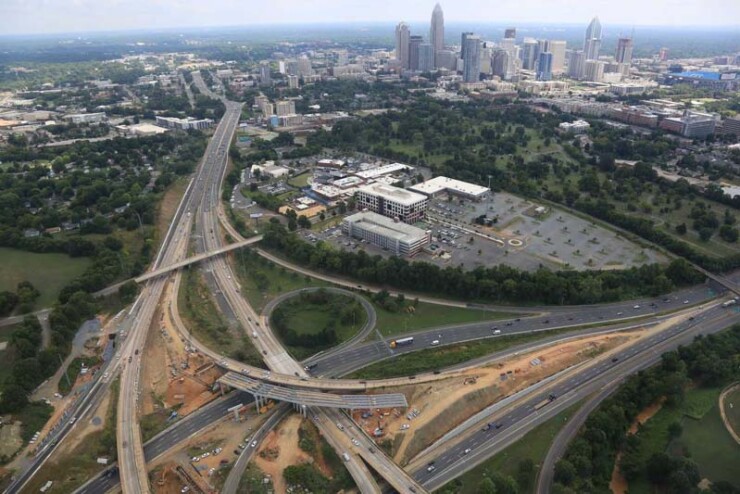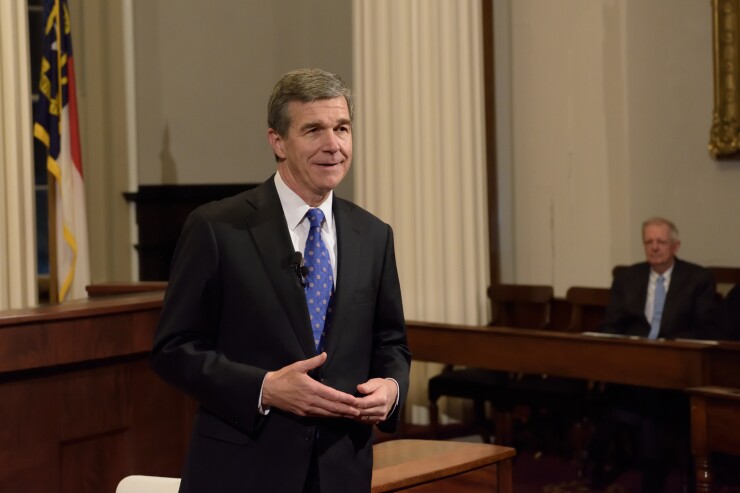Want unlimited access to top ideas and insights?
North Carolina officials are trying to figure out how to unwind parts or all of a 2014 public-private partnership that is building managed toll lanes on a Charlotte-area highway.
Ever since the ink dried on North Carolina’s first transportation P3 contract, the plan to relieve severe congestion in the Charlotte region has generated controversy.

Public opposition remains just as fierce today to the project that will add express lanes on Interstate 77, even though more than one report says the deal with I-77 Mobility Partners LLC, a consortium led by Cintra Infraestructuras S.A., was properly authorized and permitted.
The 26-mile-long project is designed to add capacity and give drivers a faster option — for a price — on a major road that serves commuters in and out of the state’s largest city. All existing general-purpose lanes will remain free for drivers, according to the North Carolina Department of Transportation, although the existing carpool lanes will be incorporated into the managed toll lanes, They will be free for vehicles with at least three occupants, up from the minimum of two today.
Many local drivers don’t want to pay tolls on an Interstate that they consider a freeway and don’t believe the express lane concept will improve the gridlock they experience driving I-77 into Charlotte for work and back home in the evening.
Gov. Roy Cooper, who also opposes the project, hired Mercator Advisors LLC to review the comprehensive agreement governing the P3.
Mercator found no problems with the P3 contract, although the firm did say that public input into the project was limited until after the procurement process was initiated.
State Auditor Beth Wood completed a performance audit in June, concluding that state laws were followed in the approval process, although a cost-benefit analysis of using a P3 versus using traditional delivery methods wasn’t done nor was it required at the time.
In January, NCDOT created a local advisory group to analyze options for dealing with the project outlined in the Mercator report. They include terminating the P3 agreement or negotiating contract modifications, both of which would be expensive and time consuming.
In the meantime, Transportation Secretary Jim Trogdon on Aug. 15 unveiled a plan to the local advisory group that he said could address some immediate concerns and expand capacity on I-77.
“I have heard loud and clear from Governor Cooper and members of both the community and the local advisory group that the preference is for NCDOT to operate this facility,” Trogdon said. “Working within current state law, this action plan allows us to pursue simultaneous actions that have the most immediate path to success without losing sight of the main objective to have NCDOT operate the facility.”
Trogdon’s plan includes negotiating toll limits to cap the maximum amount that can be charged, offering frequent user discounts, and expanding non-tolled capacity by hardening shoulders for use during peak travel periods. Some options require approval by state lawmakers.
Construction on the $650 million, 26-mile express-lane project began in November 2015. Its developers say it will open to traffic by the end of 2018, with final completion expected in September 2019.
When the project opens and tolling begins, I-77 Mobility Partners can operate the express lanes with unlimited flexibility to increase tolls — a feature that has also spurred public opposition.
“I-77 Mobility Partners is reviewing the recommendations outlined by the North Carolina Department of Transportation at the local advisory group meeting,” the company said in a statement to The Bond Buyer. “As the developer, we have made significant upgrades to the project already and we are always looking for ways to enhance the customer experience.
“In the meantime, we remain focused on completing construction and improving the commute for a large number of motorists in the greater Charlotte and Lake Norman region when the express lanes open later this year,” the statement said.
On Thursday, I-77 Mobility Partners will hold a
Terminating the P3 contract for convenience would cost the state between $540 million and $771 million, according to NCDOT estimates.
The cost is based on language in the comprehensive agreement that requires NCDOT to pay I-77 Mobility a buyout amount based on the appraised fair market value of the company’s interest plus reimbursement of reasonable costs and the cost of terminating the senior debt.
To assist in financing the project, NCDOT issued $105 million of tax-exempt private activity revenue bonds in 2015. The bonds, an obligation of the private partners, are secured by toll revenues.
The project also received a $189 million low-interest Transportation Infrastructure Finance and Innovation Act loan, and I-77 Mobility pledged $248.5 million in equity toward the project.
In 2015, Toronto-based DBRS Ltd. assigned a BBB rating to the bonds and TIFIA loan, which were rated BBB-minus by Fitch Ratings.
Both agencies affirmed their ratings in June.
DBRS’
“It is expected that this higher level of scrutiny will make modification or termination of the CA less likely,” DBRS said, adding that it will closely monitor construction and legislative processes. “In addition, any action taken by NCDOT to modify the CA that would be materially prejudicial to the project’s revenue model would also likely cause a negative rating action.”
In its report, Fitch said the project faces uncertain price sensitivity even though NCDOT’s comprehensive agreement gives I-77 Mobility Partners “relative freedom for toll-setting, with the framework allowing for dynamic tolling unhindered by toll rate caps or floors after the first six months of operations.
“Given the lack of other tolled facilities in the region, the project does potentially face some political risk,” said Fitch analyst Scott Monroe.
Five companies own I-77 Mobility Partners.
Cintra I-77 Mobility Partners owns 50.1%; GCM TH Investments LLC owns 20.58%; John Laing I-77 Holdco Corp. owns 10%; Aberdeen Infrastructure Investments Interstate 77 LLC owns 10%; and GCM BD Investments LLC owns 9.32%.
NCDOT, under former Gov. Pat McCrory’s administration, signed a 50-year comprehensive agreement with the consortium in June 2014 to design, build, finance, operate and maintain the project.
The project involves 26 miles of improvements to I-77 from Charlotte to its northern suburbs in Iredell County, and includes converting an existing lane to a managed toll lane while adding a new lane that will also be tolled.
McCrory, a Republican, lost his re-election bid in 2016 to Cooper. Some people believe anger over the project was a factor in McCrory’s narrow defeat, by a little more than 10,000 votes out of more than 4.7 million cast.

The public backlash to the express lanes has been so fierce that state lawmakers from the region have filed bills proposing to terminate the developer’s contract, although none have passed so far.
NCDOT’s formula for ranking transportation projects for funding complicates any effort to take out the contract or modify it.
The Legislature’s budget this year adds new scrutiny to any action taken by NCDOT, further hamstringing efforts to address the toll issue, according to Conway Jolly with the anti-toll group
“Consultants have told us this is a typical contract. So, we can expect toll trouble all over the state,” Jolly said in a Sept. 7 comment on the group’s website. “The state should get ahead of the curve as the population grows. Spending money on lawyers and consultants to defend bad contracts will not build roads. Toll lanes should be outlawed.”
NCDOT followed state law in approving the contract, according to two reports.
A 49-page final
“Much of the public frustration with the express lanes project can be attributed to the limited opportunity for public input during the project development period,” the report said.
North Carolina State Auditor Beth Wood completed
Wood’s 76-page audit said that NCDOT’s procurement process “adhered to all applicable policies, procedures, and state and federal laws,” and that “project policies and procedures were found to be consistent with controlling federal laws and regulations and with practices of other state transportation departments.”
The comprehensive agreement “appears to provide significant protections and terms favorable to the state,” Wood said.
While a cost-benefit analysis was not required by state law or policy when the project was procured and implemented, Wood said NCDOT did not prepare a “value for money” analysis comparing the P3 model to a traditional delivery approach to ensure that the I-77 Mobility Partners proposal provided the best value to the state.
“Value for money or similar cost-benefit analysis is required in the law or policies for other states that have extensive experience in P3 projects like Florida, Virginia and Texas,” Wood said.





